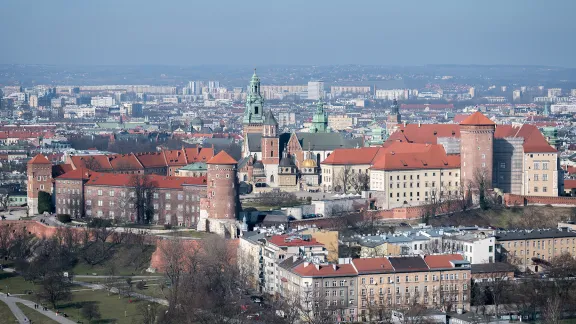Read about the history of the Lutheran church in Poland and its work in an increasingly secular society through the pages of this new brochure, introducing the host church of the upcoming LWF Assembly in Krakow

A view over the city of Krakow. Photo: LWF/Albin Hillert
Members of the Evangelical Church of the Augsburg Confession in Poland showcase their work and vision
(LWI) - ‘Welcome to Poland’ is the name of a new publication introducing the country and its Lutheran church to participants who will be gathering in Krakow from around the globe from 13 to 19 September to attend the Lutheran World Federation (LWF) Thirteenth Assembly.
With a preface by the head of the Evangelical Church of the Augsburg Confession in Poland (ECAPC), Bishop Jerzy Samiec, and contributions from many other church leaders, the brochure provides a history of Lutheranism in the region, alongside details of the work and mission of the church today. Reflecting on its role as a minority in a predominantly Catholic country, Bishop Samiec says “we take pride in our strength through the valuable contribution of our members.”
The publication also discusses the ECAPC’s wide-ranging ecumenical work with its Catholic, Orthodox and other Christian partners. Following the Russian invasion of Poland’s eastern neighbor, Ukraine, Lutheran parishes have been cooperating in the assistance of refugees fleeing from the violence, as well as supporting migrants on the Belarusian border who are trying to enter other European countries.
Credible witnesses of the gospel
The brochure explores the response of the church to many of the challenges facing people in an increasingly secular Polish society. Rev. Halina Radacz, one of the first women ordained as a pastor in 2022 says: “The increasing problem of people distancing themselves from an ecclesiastical institution [means that] it is necessary to communicate problems with a strong voice, to be socially open, to offer alternatives to those asking questions without proselytizing and, above all, to be credible witnesses of the gospel, who practice what we preach.”
As a founding member of the LWF in 1947, the Polish church has developed and maintained close ties to the global Lutheran community. The brochure features comments and reflections from current and previous LWF Council members, as well as other women and men who have attended previous LWF Assemblies. “Participating in the [Tenth] Assembly in [Winnipeg] Canada changed my view of the church,” says theologian and English teacher Dorota Czauderna-Pracka.
Rev. Piotr Gaś, pastor of Holy Trinity parish in Warsaw and former member of the ECAPC Consistory and Synod, comments: “The LWF has shaped my theological thinking to a considerable extent. It has shown me the different perspectives of the Lutheran church in the world and opened the world of the universal church to me.” This realization of belonging to the universal church, he adds, “remains for me the most precious, deepest and most vivid experience when I think of the LWF.”


